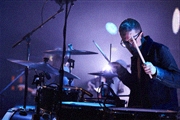Tutor HuntResources Music Theory Resources
The Role Of The Musical Director
An article discussion the role of the MD in the context of a large pentecostal church.
Date : 11/02/2018
Author Information

Uploaded by : Adam
Uploaded on : 11/02/2018
Subject : Music Theory
A Musical Director is a voice of leadership on the platform that helps to run the rehearsals, navigates the band through musical transitions, and fuels the worship leader with clear ideas that can create a moment where people can interact freely with God.A Musical Director adds unity and strength to the team on platform, by verbally communicating people through upcoming sections in the service/session. They re also the go to person for the pastor during worship. The pastor can communicate with the MD if he or she wants the worship team to do something specific. I.e. Reprise a song, end the song in a certain way, or completely change the set list. He or she can pretty much ask for anything, and the musical director will try his up most to facilitate it.The MD is an extension of the worship leader. They act as another set of eyes and ears, and are aware of his or her surroundings. They re looking to the worship leader, pastor, and congregation for direction on where to take the music. The MD also acts as the bridge between the worship leader and the musicians. He or she communicates confidently to the team on platform. They re using what they have in the natural to help people worship.I view the MD as a musical guide. You re offering the worship leader different routes to achieve the end goal people encountering with God. &At our Church, the MD is one of the musicians on platform. They might not be the strongest musician on team, but they have been chosen to be a voice of leadership because they have a great deal of experience. &The MD has a silent microphone, where he or she can communicate with the rest of the team. And he/she can communicate with F.O.H, and the stage managers sitting by the pastor.Below are some points that I believe the MD is called to do. I hope that some of the ideas can help you. Or they could just reaffirm why you do what you do every Sunday.THE ROLE OF THE MUSICAL DIRECTOR IS TO BE lt;/p>AN EXAMPLE OF PREPARATION:Learn your part, and learn everyone else s parts. You don t need to be able to play the other parts on their instrument, but you should be aware if a part is missing. It s sometimes beneficial to sing their part to them, just as a reminder. We all have mind blanks.AN EXAMPLE OF PRACTICE:Learn to love your instrument. Playing your chosen instrument should be like the best thing in the world! As an MD, knowing your instrument well is a big advantage. I say this, because you re going to have to think far ahead. Stuff like& what s come up next? What s the form of the song? I need to cue that guitar line. I need to cue the playback. Does my pastor want another song? Should we reprise or do a kick out song? What does the congregation want to do? There are a lot of things that could take up your headspace. So the more you ve practised, the easier you ll find it.A GUIDE FOR MUSICAL TRANSITIONS:I m a big fan of plotting a route through the transitions. I look for strongest routes through the set list, taking into consideration the vibe of the song (praise or worship), and key signatures. This might not be what the worship leader has in mind, but at least you have something to offer his/her. Come to the platform with ideas.PREPARE FOR THE UNEXPECTED:If you don t know numbers, I d strongly recommend investing your time in learning the chords to all the songs you could play on platform. You never know what could happen, and you ve got to be prepared to lead either way. &Numbers are a great way to call chords on the go.A BUILDER OF STRONG RELATIONSHIPS:Know the people you re leading. I wouldn t like to be led by someone I didn t know. Invest in them, not like an item, but build real friendships. Make a conscious effort to socialize with the people around you. If they trust your voice, the team will follow you.If they trust your voice, the team will follow you.CLICK TO TWEETA VOICE OF COMMUNICATION:The MD is a bridge between the worship leader and the musicians. He or she verbally cues sections, changes forms, and feels builds so they release at the right time. It s all about tension and release. If you feel the bridge should run 4 times, instead of 5, you have the authority to call a chorus.THE TIMEKEEPER DURING REHEARSALS:You have a very limited time to rehearse on a Sunday, so it s important you cover the material that s most beneficial for you. Priorities any new songs you need to run. And ask the FOH guys what they need from the band.
This resource was uploaded by: Adam
